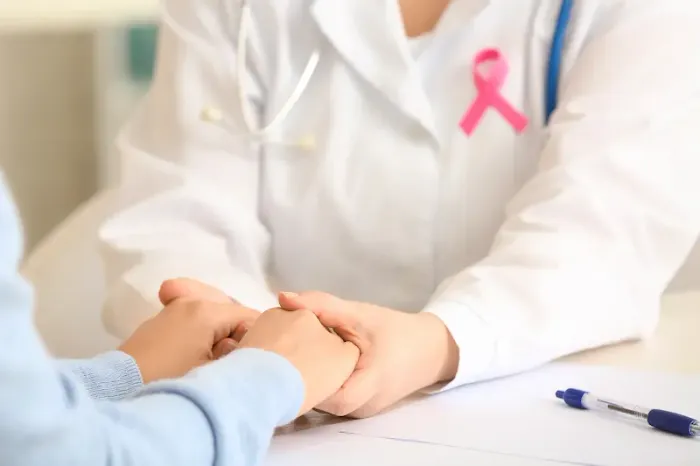Guide to Spotting Signs Of Cancer
Learn to recognize the early warning signs and symptoms of cancer. Our comprehensive guide provides essential information to help you spot potential red flags and understand when to consult a doctor.

Written by Dr. Dhankecha Mayank Dineshbhai
Reviewed by Dr. Vasanthasree Nair MBBS
Last updated on 13th Jan, 2026

Introduction
Cancer. It’s a word that evokes concern, but knowledge is our most powerful tool. While a diagnosis is serious, catching it early dramatically improves treatment success and outcomes. This guide is designed to empower you with information, not fear. We’ll walk you through the common—and sometimes subtle—warning signs of cancer that everyone should know. Remember, your body often sends signals when something is off; learning to recognize them is the first step toward taking proactive control of your health. We’ll cover universal symptoms, location-specific clues, and crucially, what to do next. If you experience any persistent symptoms, consulting a doctor online with Apollo24|7 is a convenient first step for a professional evaluation. Let’s demystify the signs and emphasize the lifesaving importance of early action.
Consult Top Specialists for Personalised Tips
What is Cancer? A Simple Explanation
How Normal Cells Become Cancerous?
At its core, cancer is a disease of uncontrolled cell growth. Normally, our cells follow a strict life cycle: they grow, divide, and die in an orderly way. Cancer begins when genetic changes disrupt this orderly process. Cells start to grow uncontrollably, forming a mass called a tumor. Tumors can be benign (noncancerous and don’t spread) or malignant (cancerous). Malignant tumors can invade nearby tissues and, through a process called metastasis, spread to other parts of the body. Understanding this basic mechanism helps explain why symptoms can appear anywhere, as rogue cells disrupt the normal function of organs and systems.
Universal Warning Signs: Symptoms That Demand Attention
Certain symptoms are common across many different types of cancer. They are your body’s general alarm system.
Unexplained Weight Loss and Loss of Appetite
Losing 10 pounds or more without trying can be one of the first early symptoms of cancer. This happens because cancer cells consume a lot of the body's energy supply or release substances that change how the body processes food energy. It can also affect your appetite, leading to a feeling of fullness even after eating very little.
Persistent Fatigue That Doesn't Improve with Rest
This isn't normal tiredness. It’s an extreme exhaustion that doesn’t get better with sleep or rest. Cancer-related fatigue occurs because the cancer is competing for nutrients, often leading to anemia (low red blood cells), which causes this profound tiredness.
Fever, Night Sweats, and Unexplained Infections
Fever is a common symptom, particularly if the cancer or its treatment affects the immune system, making it harder for the body to fight infection. Cancers like lymphoma often cause recurrent fevers and drenching night sweats that soak your bedding.
Skin Changes: More Than Just a New Mole
While new or changing moles can be a sign of skin cancer, other skin changes can also signal other cancers. Look for:
Darkening of the skin (hyperpigmentation)
Yellowing of the skin and eyes (jaundice, a sign of liver or pancreatic issues)
Reddening (erythema)
Itching
Excessive hair growth
Persistent Pain Without a Clear Cause
Pain can be an early sign with some cancers (like bone cancer) or a later symptom as a tumor presses on nerves, bones, or organs. A headache that doesn’t go away with standard treatment, for example, warrants investigation, though it's most often not cancer.
Location Specific Symptoms: Listening to Your Body
Often, symptoms are tied to the organ or system where the cancer is growing.
Changes in Bowel or Bladder Habits
Long-term constipation, diarrhea, a change in stool size (e.g., pencilthin stools), or pain when passing urine could indicate cancers of the colon, prostate, or bladder. Blood in the urine or stool is a particularly significant sign that must never be ignored.
Unusual Bleeding or Discharge
Unexplained bleeding can occur in early or advanced cancer. This includes coughing up blood, blood in the stool or urine, abnormal vaginal bleeding (especially postmenopausal), or bloody discharge from the nipple.
Thickening or a Lump Anywhere on the Body
Many cancers can be felt through the skin, most commonly in the breast, testicles, lymph nodes (neck, armpit, or groin), and soft tissues of the body. A key question many have is, "what does a cancer lump feel like?" – it's often hard, painless, and has irregular edges, though this can vary.
Persistent Indigestion or Trouble Swallowing
While usually caused by less serious conditions, persistent indigestion or dysphagia (difficulty swallowing) that doesn't resolve can be a sign of cancers of the stomach, esophagus, or throat.
Nagging Cough or Hoarseness
A persistent cough that doesn’t go away or a hoarse voice that lasts for more than a few weeks could be a symptom of lung cancer or cancers affecting the larynx (voice box) or thyroid.
Beyond the List: Understanding Your Personal Risk
Knowing symptoms is crucial, but understanding your risk profile helps contextualize them.
Genetic and Hereditary Factors
A family history of certain cancers (e.g., breast, ovarian, colorectal) can significantly increase your risk due to inherited genetic mutations like BRCA1 and BRCA2. Knowing your family history allows for earlier and more frequent cancer screening.
Lifestyle and Environmental Risks
Smoking, excessive alcohol consumption, obesity, excessive sun exposure, and exposure to certain chemicals (like asbestos) are well-established risk factors for various cancers. Mitigating these risks is a powerful form of prevention.
What to Do If You Notice a Potential Sign?
Don't Panic: Most Symptoms Are Not Cancer
The most important thing to remember is that the symptoms listed here are far more likely to be caused by benign conditions. For example, a persistent cough is much more likely to be allergies or a lingering cold than lung cancer.
The Importance of Tracking Your Symptom
Before you see a doctor, note down:
What the symptom is
When it started
If it’s constant or comes and goes
Anything that makes it better or worse
This information is invaluable for a healthcare professional.
When and How to Talk to a Doctor?
The general rule is to see a doctor if any symptom is:
Persistent: Lasting for more than two weeks.
Unexplained: Without a clear cause.
Severe: Causing significant discomfort or disruption.
If you notice any potential signs of cancer, consulting a doctor online with Apollo24|7 provides a quick, confidential way to discuss your concerns and determine if further in-person investigation is needed.
The Power of Early Detection and Screening
Recommended Cancer Screenings by Age
Screening tests look for cancer before you have symptoms. Adhering to guidelines is key:
Cervical Cancer: Pap tests (start at 21) and HPV tests.
Breast Cancer: Mammograms (typically start at 4050, discuss with your doctor).
Colorectal Cancer: Colonoscopies (start at 45 for average risk).
Lung Cancer: Lowdose CT scans for heavy smokers aged 5080.
Prostate Cancer: PSA blood test (discuss the risks and benefits with your doctor starting at age 50, or earlier for high risk men).
Apollo24|7 offers convenient home collection for tests like PSA and others that can be part of a diagnostic workup, making the process smoother.
Quick Takeaways: Key Points to Remember
Listen to Your Body: Persistent, unexplained changes are the key warning signs.
Don't Ignore Pain: Persistent pain without a clear cause needs evaluation.
Track Changes: Note any changes in weight, energy, bowel/bladder habits, or new lumps.
Know Your Risk: Understand your family history and lifestyle risks.
Screening Saves Lives: Follow recommended cancer screening guidelines for your age and risk group.
Act Early: If a symptom lasts more than two weeks, talk to a doctor. Early detection is the best defense.
Don't Panic: Most symptoms have benign causes, but a professional opinion is essential for peace of mind and health.
Conclusion
Spotting the potential early signs of cancer is less about memorizing a frightening list and more about becoming an attentive advocate for your own health. It’s about recognizing when your body is consistently signaling that something is out of its normal balance. This guide has equipped you with the knowledge to identify those signals, from universal symptoms like unexplained weight loss and fatigue to more specific clues like persistent coughs or changes in skin texture. Remember, this information is a tool for empowerment, not a reason for anxiety. The vast majority of these symptoms will have a harmless explanation. However, the critical step is taking action. If you have concerns, don't hesitate. Your health is worth it. Book a physical visit to a doctor with Apollo24|7 for a comprehensive examination and put your mind at ease. Being proactive is the most powerful choice you can make.
Consult Top Specialists
FAQs About Cancer Signs
1. What are the most common first signs of cancer?
There is no single "first sign," as it depends on the cancer type. However, universally common early warnings include unexplained weight loss, persistent fatigue, fever, and noticeable skin changes.
2. How can I tell the difference between a cancerous lump and a benign one?
You often can't touch it alone. While cancerous lumps may be hard, painless, and have irregular borders, only a doctor can truly determine the nature of a lump through physical exam and imaging tests like an ultrasound or a biopsy.
3. I have a symptom on this list. Does that mean I have cancer?
Absolutely not. These symptoms are most commonly caused by conditions far less serious than cancer. For example, fatigue can be caused by stress or sleep apnea, and a persistent cough is often due to allergies. The list is a guide for when to seek a professional opinion, not a diagnostic tool.
4. How long should I wait to see a doctor about a symptom?
A good rule of thumb is if a symptom is persistent and lasts for two weeks or more without a clear explanation, it’s time to check in with a healthcare provider.
5. Are there any specific signs of cancer in women vs. men?
Some cancers are genderspecific, like ovarian cancer in women (symptoms can include bloating, pelvic pain) or testicular cancer in men (a lump in the testicle). However, the universal symptoms like weight loss and fatigue apply to everyone.
Consult Top Specialists for Personalised Tips

Dr Aakash Andgi
General Physician/ Internal Medicine Specialist
9 Years • MBBS MD
Bengaluru
Apollo Clinic, JP nagar, Bengaluru

Dr Syed Mateen Pasha
General Physician
2 Years • MBBS
Bengaluru
PRESTIGE SHANTHINIKETAN - SOCIETY CLINIC, Bengaluru

Dr. Ashita Kuruvilla
General Physician/ Internal Medicine Specialist
7 Years • MBBS
East Midnapore
VIVEKANANDA SEBA SADAN, East Midnapore

Dr. Anand Ravi
General Physician
2 Years • MBBS
Bengaluru
PRESTIGE SHANTHINIKETAN - SOCIETY CLINIC, Bengaluru

Dr. Tamal Bhattacharyya
Pulmonology Respiratory Medicine Specialist
8 Years • MBBS, MD (Respiratory Medicine)
Kolkata
MCR SUPER SPECIALITY POLY CLINIC & PATHOLOGY, Kolkata
Consult Top Specialists

Dr Aakash Andgi
General Physician/ Internal Medicine Specialist
9 Years • MBBS MD
Bengaluru
Apollo Clinic, JP nagar, Bengaluru

Dr Syed Mateen Pasha
General Physician
2 Years • MBBS
Bengaluru
PRESTIGE SHANTHINIKETAN - SOCIETY CLINIC, Bengaluru

Dr. Ashita Kuruvilla
General Physician/ Internal Medicine Specialist
7 Years • MBBS
East Midnapore
VIVEKANANDA SEBA SADAN, East Midnapore

Dr. Anand Ravi
General Physician
2 Years • MBBS
Bengaluru
PRESTIGE SHANTHINIKETAN - SOCIETY CLINIC, Bengaluru

Dr. Tamal Bhattacharyya
Pulmonology Respiratory Medicine Specialist
8 Years • MBBS, MD (Respiratory Medicine)
Kolkata
MCR SUPER SPECIALITY POLY CLINIC & PATHOLOGY, Kolkata



.webp)
